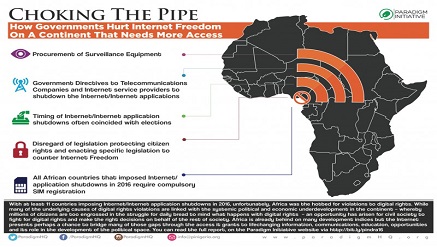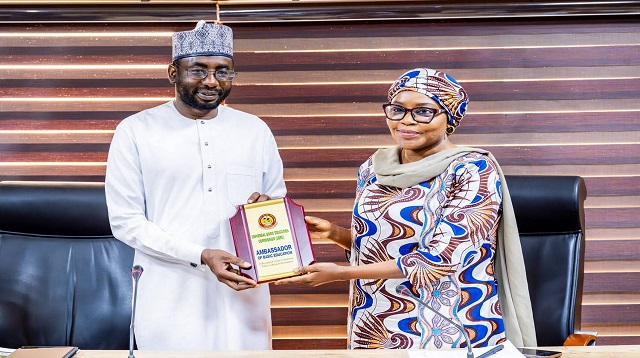E-Business
Africa: Internet Freedom in a Season of Elections

Digital rights concerns for Africa seem to be on the rise and so does the need to mount guard for its protection and respect across the region.
Chief among these concerns is the wanton disregard for respect for human rights online by the state authorities. This has spurred many civil society actors to demand dialogues from governments and when this fails, seek legal redress on many of these issues.
This is why Paradigm Initiative from Nigeria was in Court on June 28, 2017, to challenge the inaction of the country’s Ministry of Science and Technology towards the freedom of information request sent to it.
The request was made to ascertain claims that the Ministry was to build and launch two satellites capable of snooping on the private details of citizens. The hearing has since been rescheduled for September 29, 2017.
A few weeks from now, important national elections will be held in three demographically important African states. On August 4, Rwandans will be heading to the polls to elect a President. On August 8 and August 23 respectively, Kenyans and Angolans will also choose their President and Prime Minister in eagerly anticipated elections.
Even though Kenya has recently committed to not shutting down the Internet for the upcoming elections, it has become more imperative not to lose guard of shutdowns incidents that are currently sweeping through the continent.
One of such is the perennial case of Ethiopia. According to the Freedom on the Net report for 2016, the country is one of the two ranked as not free in terms of Internet freedom on the continent. This same antecedent was also duly reported in the Digital Rights Report for Africa 2016.
This also follows in the heel of a recent Internet shutdown in the country on May 31, 2017, to prevent exam question leakages. While it is high time governments got more creative on better means of engaging malpractices during exams other than shutting down the Internet, civil society organisations can also step in to fill the gap constantly created by these excuses by coordinating with authorities on smarter ways that do not disrupt Internet activities in many of these countries.
A Ugandan non-governmental organisation, Unwanted Witness has also joined 22 other international organisations to petition the Malian government on the recent Internet shutdown in the country. Many of these Internet violations occur regularly in these countries because they do not seem to be on the radar of many International human rights observers.
This apathy could also be traced to why the reign of impunity is supreme other than the rule of law in many of these countries.
There have also been reports of Internet disruptions in Congo Brazzaville due to an alleged submarine cable cut. Even though there has been widespread information that the disruption coincides with when the government of the country seems to be having a row with major dissenting voices in the country.
Election time in Africa is usually accompanied by digital rights violations – notably Internet and Internet applications shutdowns.
In 2016, five African countries – Chad, Gabon, Gambia, Uganda, and Zambia shut down the Internet/Internet applications during elections. Authorities in a sixth country, Ghana, threatened to shut down social media ahead of the December 2016 elections but were dissuaded from doing so partly because citizens made it clear it would have electoral consequences for the ruling party.
Ahead of the elections, there is much to worry about as plans are already in place to stifle Internet freedom in these countries.
In Rwanda, the government placed restrictions on the use of social media by presidential candidates, a decision which however has been recently reversed. In Angola, policies put in place in 2016 – plans to regulate social media announced by the President in his new year’s speech, and the creation of the “Angolan Social Communications Regulatory Body” to ensure compliance with new media laws, are threats to digital rights during the elections.
In January, the Kenya Communications Agency warned it could shut down the Internet during the elections, and announced the purchase of surveillance equipment for social media and mobile phones.
In March 2017, a court upheld the original court judgment to stop the installation of the mobile phone surveillance system and the last is yet to be heard of this development.
An opportunity has arisen for civil society actors to rally African citizens to uphold digital rights. Evidence from Africa in 2016 showed that the best results in defence of digital rights were obtained when civil society worked with local actors to defend digital rights, rather than waiting for the international community’s intervention through organs such as the United Nations and the African Union. In any case, an intervention by the international community is made more effective by on-going local action by citizens.
In Zimbabwe, despite government shutting down of Whatsapp during the #ZimShutDown2016 protests, citizens found other ways to mobilise to get their voices heard. In our quest to uphold digital rights during this election season, perhaps when we manage to find creative ways to mobilise citizens despite shutdowns like the Zimbabweans did in 2016, or when as seen in Ghana last year, citizens make it clear there will be electoral consequences for Internet shutdowns, real progress will be made.
Babatunde Okunoye and Tomiwa Ilori works as research assistant and program assistant with Paradigm Initiative respectively.
E-Business
AI Slows Down some Experienced Software Developers, Study Finds

Contrary to popular belief, using cutting-edge artificial intelligence tools slowed down experienced software developers when they were working in codebases familiar to them, rather than supercharging their work, a new study found.

AI research nonprofit METR conducted the in-depth study, on a group of seasoned developers earlier this year while they used Cursor, a popular AI coding assistant, to help them complete tasks in open-source projects they were familiar with.
Before the study, the open-source developers believed using AI would speed them up, estimating it would decrease task completion time by 24%. Even after completing the tasks with AI, the developers believed that they had decreased task times by 20%. But the study found that using AI did the opposite: it increased task completion time by 19%.
The study’s lead authors, Joel Becker and Nate Rush, said they were shocked by the results: prior to the study, Rush had written down that he expected “a 2x speed up, somewhat obviously.”
The findings challenge the belief that AI always makes expensive human engineers much more productive, a factor that has attracted substantial investment into companies selling AI products to aid software development.
AI is also expected to replace entry-level coding positions. Dario Amodei, CEO of Anthropic, recently told Axios that AI could wipe out half of all entry-level white collar jobs in the next one to five years.
Prior literature on productivity improvements has found significant gains: one study found using AI sped up coders by 56%, another study found developers were able to complete 26% more tasks in a given time.
But the new METR study shows that those gains don’t apply to all software development scenarios. In particular, this study showed that experienced developers intimately familiar with the quirks and requirements of large, established open source codebases experienced a slowdown.
Other studies often rely on software development benchmarks for AI, which sometimes misrepresent real-world tasks, the study’s authors said.
The slowdown stemmed from developers needing to spend time going over and correcting what the AI models suggested.
“When we watched the videos, we found that the AIs made some suggestions about their work, and the suggestions were often directionally correct, but not exactly what’s needed,” Becker said.
The authors cautioned that they do not expect the slowdown to apply in other scenarios, such as for junior engineers or engineers working in codebases they aren’t familiar with.
Still, the majority of the study’s participants, as well as the study’s authors, continue to use Cursor today.
The authors believe it is because AI makes the development experience easier, and in turn, more pleasant, akin to editing an essay instead of staring at a blank page.
“Developers have goals other than completing the task as soon as possible,” Becker said. “So they’re going with this less effortful route.”
E-Business
Firm Uncovers $500K Crypto Heist Through Malicious Packages

Kaspersky GReAT (Global Research and Analysis Team) experts have discovered open-source packages that download the Quasar backdoor and a stealer designed to exfiltrate cryptocurrency. The malicious packages are intended for the Cursor AI development environment, which is based on Visual Studio Code — a tool used for AI-assisted coding.

The malicious open-source packages are extensions hosted in the Open VSX repository that claim to provide support for the Solidity programming language. However, in practice, they download and execute malicious code on users’ devices.
During an incident response, a blockchain developer from Russia reached out to Kaspersky after installing one of these fake extensions on his computer, which allowed attackers to steal approximately $500,000 worth of crypto assets.
The threat actor behind these packages managed to deceive the developer by making the malicious package rank higher than the legitimate one. The attacker achieved this by artificially inflating the malicious package’s downloads count to 54,000.
After installation, the victim gained no actual functionality from the extension. Instead, malicious ScreenConnect software was installed on the computer, granting threat actors remote access to the infected device.
Using this access, they deployed the open-source Quasar backdoor along with a stealer that collects data from browsers, email clients, and crypto wallets. With these tools, the threat actors were able to obtain the developer’s wallet seed phrases and subsequently steal cryptocurrency from the accounts.
After the malicious extension downloaded by the developer was discovered and removed from the repository, the threat actor republished it and artificially inflated its installation count to a higher number – 2 million, compared to 61,000 for the legitimate package. The extension was removed from the platform following a request from Kaspersky.
“Spotting compromised open-source packages with the naked eye is becoming increasingly difficult. Threat actors are using increasingly creative tactics to deceive potential victims, even developers who have a strong understanding of cybersecurity risks — particularly those working in the blockchain development field.
As we expect adversaries to continue targeting developers, it is recommended that even experienced IT professionals deploy dedicated security solutions to safeguard sensitive data and prevent financial losses,” commented Georgy Kucherin, Security Researcher with Kaspersky’s Global Research and Analysis Team.
The threat actor behind the attack published not only malicious Solidity extensions but also another NPM package, solsafe, which also downloads ScreenConnect. A few months earlier, three additional malicious Visual Studio Code extensions were released — solaibot, among-eth, and blankebesxstnion — all of them have already been removed from the repository.
E-Business
NITDA Reaffirms Commitment to 95% Digital Literacy by 2030, as UBEC Pledges Collaboration

Kashifu Inuwa CCIE, the Director General of the National Information Technology Development Agency (NITDA), has reaffirmed the Federal Government’s unwavering commitment to achieving 95% digital literacy across Nigeria by the year 2030, with an ambitious milestone of 70% by 2027.

This disclosure was made in total alignment with the present administration’s priority areas of reforming the economy for sustained inclusive growth and accelerating diversification through industrialisation, digitisation, creative arts, manufacturing, and innovation.
Making this known during a collaborative meeting hosted by the Universal Basic Education Commission (UBEC), Inuwa highlighted the government’s strategic prioritisation of human capital development as central to its national transformation agenda.
“We started this journey in 2023 when President Bola Ahmed Tinubu came on board and he made it clear that economic diversification and inclusivity are part of the administration’s agenda,” he noted.
“And the president outlined this in 8 priority areas to achieve the vision, with priority number 7 specifically focused on accelerating industrialisation, digitisation, creative arts, manufacturing, and innovation,” he added.
Recognising the importance of digital fluency in achieving this agenda, he stated that NITDA is committed to investing in the digital empowerment of citizens through the development of the National Digital Literacy Framework (NDLF), a strategic blueprint aligned with international best practices.
He added that to tailor the framework to Nigeria’s specific needs, 6 core competency areas were incorporated to include device and software operations, information and data literacy, communication and collaboration, content creation, safety, and problem solving.
He explained that the framework would address all levels of digital fluency, from basic, intermediate to advanced levels, to make digital skills accessible to every Nigerian, from primary school pupils to working professionals.
According to Inuwa, despite data limitations, NITDA estimates that Nigeria’s digital literacy rate currently stands at 50%, up from 44% in 2021, based on extrapolations from the World Bank’s Better Life Report.
The NITDA DG disclosed that the agency has been working closely with the Nigerian Educational Research and Development Council (NERDC) in developing a curriculum for digital literacy, which can be infused into formal education. Stating that the visit is a continuation of NITDA’s ongoing engagements with key education stakeholders, including the Federal Ministry of Education, the National Universities Commission (NUC), and the Nigerian Educational Research and Development Council (NERDC), all aimed at advancing digital literacy across all levels of learning.
Inuwa also revealed ongoing collaborations with global platforms such as Coursera to train teachers using AI-powered lesson generation tools and provide scalable online training.
It is worth recalling that late last year, NITDA partnered with the Nasarawa State University in collaboration with CISCO in launching the Digital Learning for NSUK (DL4NSUK) initiative to enhance digital literacy in tertiary institutions, and equipping graduates with the skills needed to be digitally proficient and globally competitive.
While stressing that the entire process, from curriculum development to classroom delivery, would require a whole-of-government and whole-of-society approach, Inuwa said, “This is not a journey we can walk alone; we must bring everyone on board, education stakeholders, technology providers, state governments, and international partners.”
In response to the DG’s remarks, UBEC Executive Secretary, Hajiya Aisha Garba, confirmed that the Commission has officially received the digital literacy curriculum developed by NITDA and NERDC and has commenced internal review processes.
She acknowledged the curriculum as robust and forward-looking but stressed the need for simplification to suit early learners and teachers, citing challenges such as curriculum overload, limited teacher capacity, and inadequate infrastructure as key barriers to effective implementation.
She pledged that UBEC, in partnership with the State Universal Basic Education Board (SUBEB), will lead efforts to equip schools with computers and solar-powered infrastructure to support real learning.
“We’re committed to working with NITDA and NERDC to refine the curriculum, train teachers, and ensure effective delivery. Let us align the technical vision with grassroots realities to make a lasting impact,” she concluded.
To formalise the implementation of the meeting’s resolutions, a joint inter-agency committee was established to develop strategic plans that will ensure the effective rollout of the digital literacy initiative, to equip young Nigerians with the essential digital skills required to thrive in an increasingly dynamic and technology-driven global landscape.

 News3 days ago
News3 days agoJAMB Accuses Student of Securing Admission through Identity Fraud

 News3 days ago
News3 days agoCheck Point Report Finds Africa as Top Target for Cyber-attacks

 E-Financial3 days ago
E-Financial3 days agoEFCC Recovers Funds Lost to CBEX Fraud

 Telecom2 days ago
Telecom2 days agoNCC Speaks of Plans to Secure Telecom Infrastructure Nationwide

 General News2 days ago
General News2 days agoAirtel Nigeria Drives BFSI and Utility Sector Innovation with Industry-wide Workshop

 E-Financial3 days ago
E-Financial3 days agoFinancial Fraud in Nigeria Surges by 45 Percent, 70 Percent of Losses Linked to Digital Platforms – CBN

 Telecom2 days ago
Telecom2 days agoAfrica’s Lawmakers Commit to Strengthening AI, Digital Health and Smart Manufacturing Frameworks

 E-Business3 days ago
E-Business3 days agoFirm Uncovers $500K Crypto Heist Through Malicious Packages













